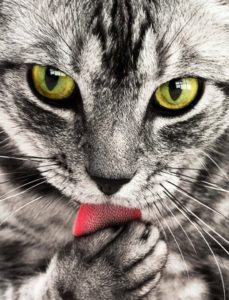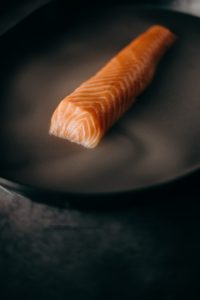
There is no denying that you all love your cats, otherwise you would not be taking the time to read our posts and ask questions about them.
One frequently asked question, Doc, Cornucopia Pet Foods’ licensed and practicing veterinarian who has been active for over 50 years, has been receiving quite a lot lately, concerns cats and fish food.
An example of one such question has been, “Why does my cat love salmon?
Why Does My Cat Love Salmon?
Fish is healthy for humans to eat, and nutritionists will often recommend including some fish protein in your diet. One nutritious fish species that is popular and comes highly recommended is salmon.
Salmon is dense in nutrients like high-quality protein, omega-3 fatty acids, and vitamins A, B, and D-which all have medicinal use. In particular, omega-3 fatty acids contain excellent antioxidant properties that are beneficial to keeping the heart, brain, and eyes healthy. Salmon also has calcium, selenium, magnesium, potassium, and phosphorus, which are essential for a healthy body and mind.
As much as salmon’s nutrients are good for us, so are they for your cat!
Cooked salmon (never raw PLEASE) is equally a high-protein source for your cat. Its high omega-3 fatty acids are essential for skin and coat. It is high in potassium, B vitamins, selenium, and niacin-mineral content that are essential for your cat to thrive. In a summary, salmon supports your cat’s immune system and brain health.
It is also for the beneficial reasons of salmon outlined above, that Cornucopia Pet Foods includes salmon as one of the main ingredients in their All-Natural Organic Cat Food and Superpack Special for Cats. Both contain real pet food that is non-toxic and allows your pet to live a longer, healthier life through the power of Metabolizable Energy and Preventive Nutrition.
However, cooked salmon has its benefits for your cat, and depending on the species of salmon, it is also high in cholesterol. In some salmon species, cholesterol ranges between 23–214 mg/100 g. In All-Natural Organic Cat Food and Superpack Special for Cats, only the best species of salmon that will keep your cat happy and healthy are included.
Nonetheless, though your cat can eat and love cooked salmon, this is not to say salmon should be its staple diet or main food. Your kitty cannot live on salmon alone. This is because salmon does not contain enough taurine to keep your cat healthy.
Taurine is mostly found in animal-based proteins. As such, a diet primarily based on taurine-deficient salmon can lead to serious health issues. Such as blindness and heart complications.
So, to an extent, if your cat loves cooked salmon, it undoubtedly and instinctively knows what is good for it. However, that said, also note that our cats being the proud animals they are can sometimes be picky. Some cats have been known to get addicted to salmon resulting in them refusing anything else you give them. Something that you might misread as your cat loving salon and overfeeding it the fish!
PLEASE BE WARNED cat parents. Doing so only compromises your cat getting a protein and nutrient-rich diet.
Ideally, your cat thrives most when it has a varied diet that includes many different meat sources. Such as those in our All-Natural Organic Cat Foodand Superpack Special for Cats.

Can Cats Eat Tuna and Salmon?
Much as you can feed your salmon-loving cat salmon, you can alternate cooked salmon with cooked tuna-although in moderation, of course. Preferably as an alternate cooked fish treat.
As with cooked salmon, cooked tuna is nutritionally beneficial and safe for you tabby-though maybe not as much as salmon. Like salmon, tuna contains high protein levels and unsaturated fats; nutrients which are beneficial for your cat’s health.
PLEASE note that some commercially tinned tuna will include additives such as vitamins, minerals, and taurine to increase their nutritional profile. Then they claim the tinned tuna is safe for cats to eat. Canned tuna is, however, not healthy for your cat. This is because a lot of salt is added to preserve the tinned fish, and too much salt is not good for your cat.
The combination of preservative additives and sodium in canned tuna can cause lots of problems. For example, malnutrition and dehydration. Should your cat be in love with tinned tuna, then minimize tuna treats to once a week or less.
In addition, at Cornucopia Pet Foods, we have it on record that canned tuna tends to increase the risk of mercury poisoning in cats. For this reason, we recommend your beloved cat to only occasionally eat cooked tuna and our, All-Natural Organic Cat Food and Superpack Special for Cats, in which we have included only naturally and organically preserved fish, to keep your cat happy and healthy.
Benefits of Fish Food for Cats
It is inarguable that cooked fish is a good and high-quality protein option for your cat. The benefits of fish as food for your cat are that it:
- is rich in protein and carb-free.
- has lean meat-if wild salmon
- provides vitamin A and multiple vitamin B Complex
- is one of the few natural food sources of vitamin D-for instance, wild salmon.
- has edible bones, making it a good source of calcium which is good for your cat’s bone formation.
- contains other minerals like magnesium, phosphorus, potassium, zinc, and selenium.
- can improve your cat’s immune system and strengthen its bones, especially selenium.
However, while some cats may benefit from occasionally eating cooked fish, others may not.









